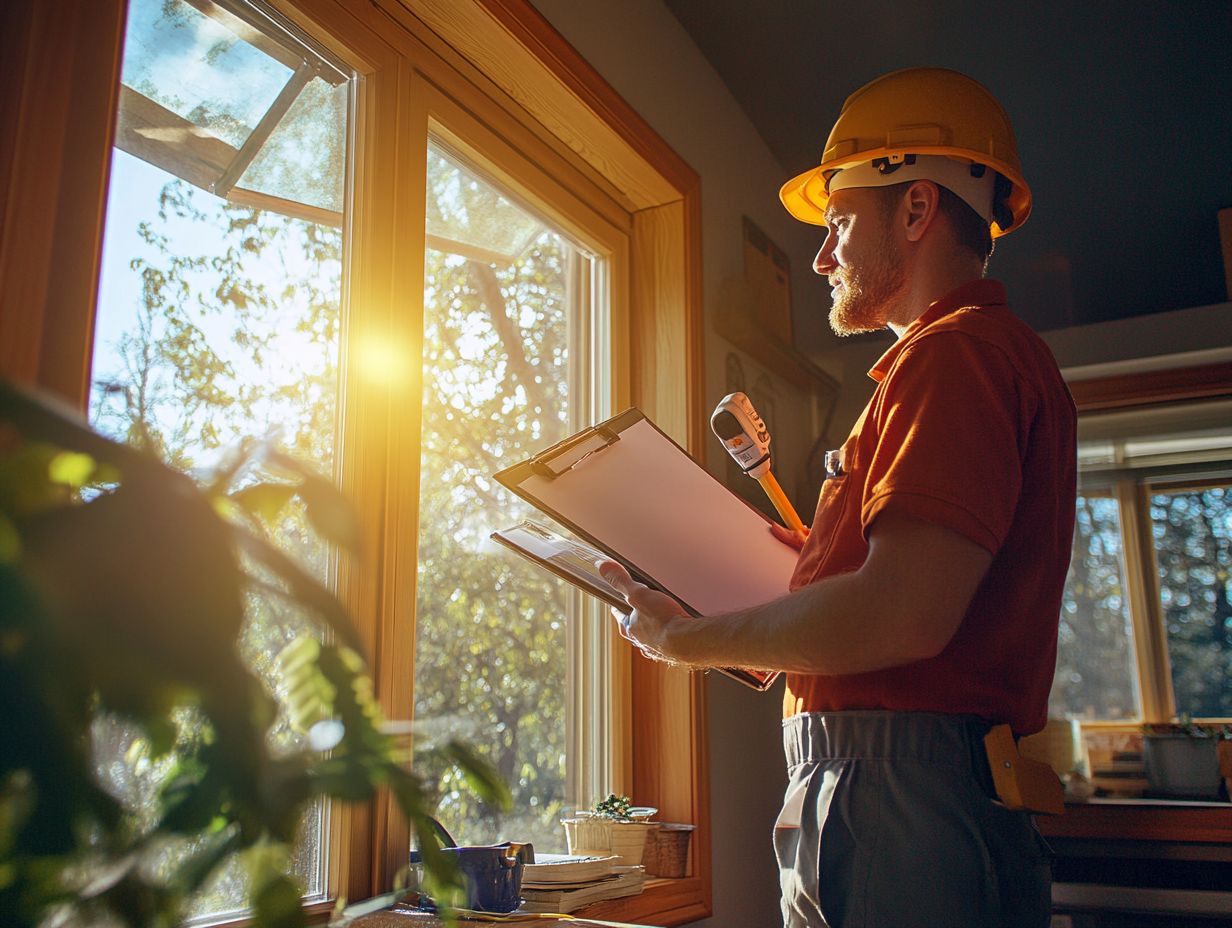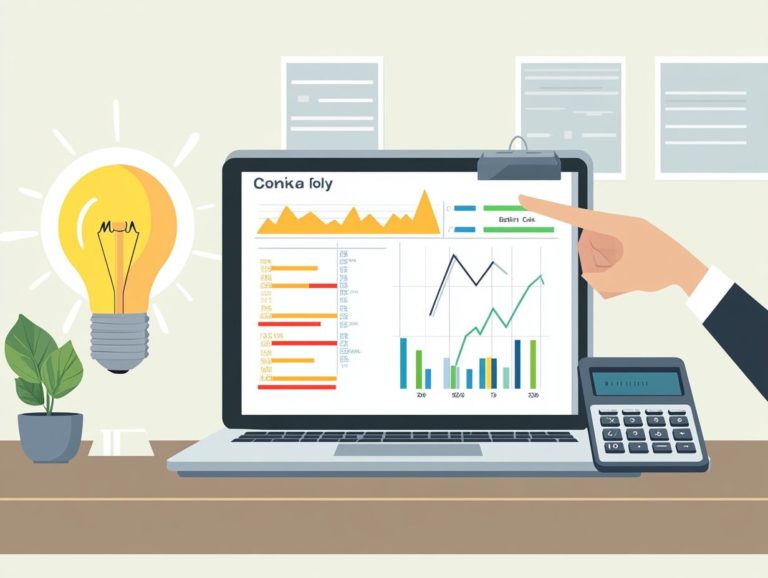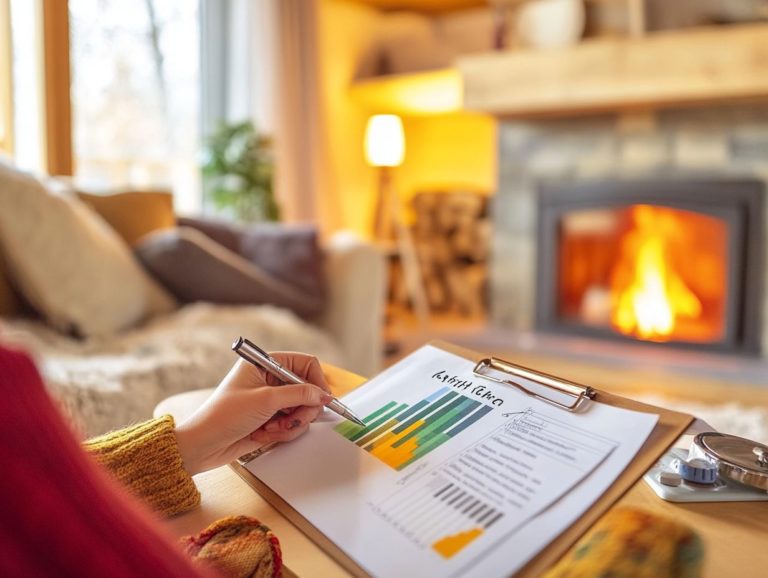An Overview of Home Energy Audit Process
Don t wait lower your energy bills and make your home more eco-friendly today with a home energy audit!
Are you seeking to lower your energy bills while enhancing your home’s eco-friendliness? A home energy audit could be just the solution you need.
This thorough process reveals how energy flows through your home and identifies specific areas where you can boost efficiency. Understanding the purpose and benefits of an audit will help you apply practical solutions.
Explore how small adjustments can lead to substantial savings and a more sustainable lifestyle.
Contents
- Key Takeaways:
- What is a Home Energy Audit?
- Benefits of a Home Energy Audit
- The Home Energy Audit Process
- Common Areas of Energy Loss
- Tools and Techniques Used in a Home Energy Audit
- Interpreting the Results of a Home Energy Audit
- Implementing Energy Efficiency Measures
- Identifying and Addressing Problem Areas
- Energy Efficient Home Improvement Tips
- Monitoring Energy Consumption
- Understanding Energy Rebates and Incentives
- Choosing Between Professional and DIY Energy Audits
- Exciting Future Trends in Home Energy Audits!
- Frequently Asked Questions
Key Takeaways:
Here s what you need to know about home energy audits!

A home energy audit is a comprehensive evaluation of a home’s energy usage and potential areas for improvement. By preparing your home for an energy audit, you can achieve cost savings and reduce your environmental impact by identifying and addressing areas of energy loss. The home energy audit process involves a step-by-step guide, tools and techniques for measuring energy usage, and implementing efficiency measures based on the results.
What is a Home Energy Audit?
A home energy audit evaluates your residence to find ways to use energy more efficiently. You can choose between a professional audit or a DIY assessment to discover insights about insulation and air leaks. Following the best practices for conducting energy audits can help you pinpoint these areas, unlocking significant energy savings, reducing your utility bills, and fostering a more sustainable living environment.
Benefits of a Home Energy Audit
A home energy audit can save you money and improve your living conditions! The advantages go well beyond simple energy savings; they encompass financial benefits and positive environmental impacts that can greatly elevate your quality of life as a homeowner.
The Home Energy Audit Process
An energy auditor will carefully check your home’s energy performance and identify improvement areas. Through this comprehensive evaluation, you’ll uncover specific areas ripe for improvement, leading to valuable energy audit insights for new home buyers, resulting in a clear report about your energy use.
Common Areas of Energy Loss
Energy loss typically occurs in poorly insulated walls and air leaks, increasing your bills and affecting air quality.
Tools and Techniques Used in a Home Energy Audit

In a home energy audit, you’ll find an array of sophisticated tools and techniques at your disposal. Tools like thermal cameras and blower door tests help measure energy use and find problems, making it valuable to refer to the complete guide to home energy assessments for a comprehensive understanding.
Interpreting the Results of a Home Energy Audit
Interpreting the results of a home energy audit requires a keen understanding of the energy audit report. This document includes energy efficiency ratings and offers valuable, actionable recommendations for attaining significant energy savings. Consider utilizing energy audits: tools for home improvement to gain insights and take action to improve your home’s energy use.
Implementing Energy Efficiency Measures
Take action based on your audit to save energy and enhance your home’s comfort. Implementing energy efficiency measures is an essential step you can take following a home energy audit.
Identifying and Addressing Problem Areas
Spot and fix energy loss areas now to save on bills and boost your home’s performance. Identifying and addressing problem areas during a home energy audit is crucial for maximizing energy efficiency.
Energy Efficient Home Improvement Tips
Implement these tips to cut energy use and improve your home’s comfort! By following energy-efficient home improvement tips, you can significantly reduce energy consumption while enhancing the comfort levels within your residence.
Monitoring Energy Consumption

Monitoring energy consumption is essential for homeowners looking to enhance energy efficiency. This practice provides valuable insights into your energy usage patterns, helping you identify opportunities for significant savings.
Understanding Energy Rebates and Incentives
Understanding energy rebates and incentives can unlock substantial financial benefits for homeowners eager to improve their property s energy efficiency after a home energy audit.
Choosing Between Professional and DIY Energy Audits
When deciding between a professional energy audit and a DIY approach, remember that this choice affects the effectiveness of the assessment.
It directly impacts your ability to achieve the desired energy efficiency improvements in your home.
Exciting Future Trends in Home Energy Audits!
Future trends in home energy auditing are transforming how we approach energy efficiency.
By integrating advanced technologies and innovative methods, these trends significantly elevate the accuracy and effectiveness of your audits.
Check out this video for a quick guide on home energy audits!
Frequently Asked Questions
What is a home energy audit?

A home energy audit is a detailed evaluation of a home’s energy use and efficiency. It involves a trained professional inspecting the home and identifying areas of energy waste or inefficiency, which can be better understood through understanding energy audits.
Why is a home energy audit important?
A home energy audit is important because it helps homeowners save money on energy bills, increase comfort, and reduce environmental impact. For those interested in learning more, conducting a DIY energy audit allows homeowners to pinpoint energy waste, enabling targeted improvements.
What are the steps involved in a home energy audit?
The steps in a home energy audit typically include:
- A visual inspection of the home’s exterior and interior.
- A blower door test, which measures air leakage.
- A thermographic scan to detect heat loss areas.
- An evaluation of the home’s appliances and energy systems.
Who can perform a home energy audit?
A home energy audit is typically performed by a certified energy auditor or home inspector. For those interested in conducting one themselves, learning how to conduct a home energy assessment can provide valuable insights. These professionals have the training and equipment to accurately assess a home’s energy use and efficiency.
How long does a home energy audit take?
The duration of a home energy audit can vary based on the size and complexity of the home. On average, it can take 2 to 4 hours to complete.
What can I expect from the results of a home energy audit?
The results of a home energy audit will provide you with a detailed report outlining specific areas of energy waste and recommendations for improving energy efficiency. For a comprehensive approach, you can refer to energy audits: a step-by-step guide, which can help prioritize and plan necessary upgrades or improvements.






